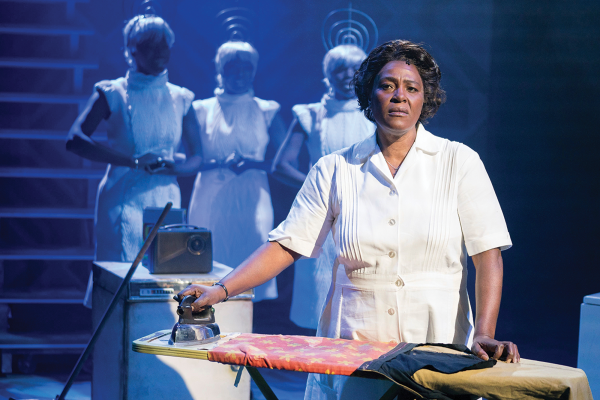“NOTHING EVER HAPPEN under ground in Louisiana / Cause they ain’t no under ground in Louisiana. / There is only / under water.” With these words, playwright Tony Kushner draws us into the conundrum at the heart of the musical Caroline, or Change: How do you swim when you’re already so far below sea level? Caroline Thibodeaux (played by Sharon D Clarke in Roundabout Theatre Company’s Broadway revival production) is our eponymous anti-heroine, a 39-year-old maid and divorced mother of four, trying desperately to answer this question in every area of her life.
Based in part on Kushner’s own childhood, Caroline, or Change speaks through the sounds of Motown, gospel, klezmer, and blues—handily packaged by composer Jeanine Tesori—to tell the story of an uneasy friendship between Caroline and her employer’s son, 8-year-old Noah Gellman. The Gellman home becomes a larger metaphor for a country stratified by a brutal socioeconomic caste system, emphasized in the staging by a multilevel set. The structure of 1960s America is made visible, placing each character in predetermined roles, and thus unable to truly see each other.
In a different play, the Gellmans’ Jewish heritage and Caroline’s Blackness would be a source of solidarity. But, as the play progresses, irreconcilable divisions emerge between Caroline’s life and the Gellmans’ middle-class woes, bracketed by those ever-present stairs. The conflict comes to a partial head when Rose, Noah’s stepmother, decides that Caroline can keep any money she finds in Noah’s pockets while doing laundry. At first, this is fun for Noah, who is fascinated by Caroline’s inscrutability. That is, until Noah’s Hanukkah gift ($20) winds up in the bleach cup where the lost coins go. In a depressing showdown, Caroline and Noah trade antisemitic and anti-Black epithets before walking away, ashamed. Caroline initially quits her job; when she returns, she names for Noah the distance that was always between them.
It’s fitting that the basement is where this collision takes place, peeling back facades of deference and niceness—to reveal thinly veiled violence and chaos. Gaston Bachelard writes about similar affects in his seminal text, The Poetics of Space. He suggests that our homes shape us both imperceptibly and irrevocably. Of course, as one might guess, not all rooms are created equal, nor the dreams they inspire. The cellar gets especially rough treatment from Bachelard, who calls attention to its “buried madness” and “walled-in tragedy.” The walled-in tragedy is the economic reality that forces Caroline to fight with a child over money. The tragedy is a world that keeps asking Caroline to change—to soften—without giving her much proof that it will improve.
As I left the theater, I kept wondering about the musical’s ethos. Asking someone to bend toward hope when her hope has been shattered so many times seems cruel and quixotic. But as we turn to a new year, the possibility of hope remains vital. I’m not sure yet how we hold onto dreams for a just future when injustice is built into the very architecture of this country. Perhaps we sing to each other when speaking holds no more weight. We try to look ourselves in the eye. We extend grace even when it’s inadequate. We might do as Caroline’s daughter does, toppling Confederate idols in secret. Most importantly, maybe we try to create a world where our comfort does not require anyone’s debasement.

Got something to say about what you're reading? We value your feedback!







